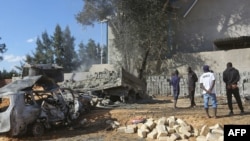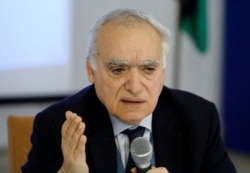Libya's foreign minister said Monday that a deadly drone strike on a biscuit factory in the capital, Tripoli, may be a war crime.
"This is a war crime by all means," Mohamed Taher Siala told the U.N. Security Council during its regular meeting to discuss the situation in the North African country.
The U.N.'s top official in Libya, Ghassan Salamé, told the council via a video link from neighboring Tunis that at least 10 people were killed and more than 35 others injured in Monday's strike.
"It appears the majority of the dead were migrants, but that at least two were Libyans," Salamé said. "Regardless of whether the attack deliberately targeted the factory or was an indiscriminate attack, it may constitute a war crime," he added, echoing the foreign minister's charge.
No group has claimed responsibility.
Tripoli has been at the center of the latest cycle of fighting since April, when forces loyal to Gen. Khalifa Haftar moved from their stronghold in eastern Libya west toward Tripoli, in a bid to capture the capital from internationally recognized Prime Minister Fayez al-Serraj and the Presidential Council.
Libya's foreign minister said foreign interference is a main driver of conflict in his country.
"We have repeatedly cautioned that this crisis would exacerbate because of the irresponsible interference and indifference of certain states to the outcome of the situation in my country," he said.
Several countries have breached a U.N.-imposed arms embargo imposed on Libya in February 2011, in response to serious human rights violations by the government of dictator Moammar Gadhafi during the revolution that led to his ouster and eventual killing. The sanctions have remained in place, but the internationally-recognized government is allowed to receive arms supplies if approved by the U.N. sanctions committee. Militias are not.
Egypt, France and the UAE are among the countries accused of sending weapons to Haftar.
Siala asked how militias challenging the government have obtained their arsenals.
"My delegation reiterates here that many states have breached this resolution and supplied aggressive forces with advanced weapons," he said without naming any.
Salamé, who was on the cusp of spurring the parties toward a peace process when Haftar moved on Tripoli in April, said the coming weeks are "critical" for the country and urged success for an international conference planned in Berlin.
"External investment in the conflict risks surpassing the amount of national involvement, taking control of Libya's future away from the Libyans and putting it in the hands of foreign parties," he warned. "Once invited in, foreign intervention is the guest that settles and seizes control of the house."





